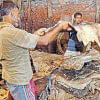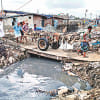Bangladesh needs to rebuild its disaster management system

This year's UN Climate Change Conference, COP29, ended in a controversial deal. After much bargaining, rich countries have promised to provide a mere $300 billion annually to adapt to weather extremities, which is much less than expected by the struggling nations. This has left the heads of these affected countries highly disappointed.
Prof Muhammad Yunus, the Chief Adviser to the Interim Government of Bangladesh, also participated in this conference. He expressed disappointment during an interview with an international media outlet, stating that COP is not a fish market to bargain for climate funds. The emitter countries are responsible for the frequent natural disasters that occur in developing nations and therefore should compensate them.
While the head of the interim government expressed his anger in Baku, his government, on the other hand, has not been able to rehabilitate the people affected by a major flood in the southeastern part of Bangladesh after three months of its occurrence, which is disappointing too. According to a recent media report, the work of rehabilitation is still underway and will take more time, whereas already one crop season has passed.
Bangladesh is one of the world's most climate-vulnerable countries, ranking seventh globally in the 2021 World Climate Risk Index. About 50 million people in this country live under the risk of climate hazards. On October 6, a press conference of the Centre for Policy Dialogue (CPD) revealed that the damage caused by floods in the southeastern region this year amounted to Tk 14,421 crore. Of this, agriculture and forest sectors suffered the most—approximately Tk 5,169 crore. According to data from the Feni Department of Agricultural Extension (DAE), the recent flooding damaged crops worth Tk 524 crore in this district. But the government has reimbursed only Tk 20 crore 71 lakhs to them.
On November 17, the Feni Department of Agriculture Office informed that the number of farmers affected by the Feni flood was almost 158,000. However, only 35,000 of them have got incentives so far. The affected farmers received a small amount of vegetable seeds, paddy seeds, and fertilisers as incentives for Boro seasons which is completely inadequate compared to the damage.
According to the 2024 Feni District Relief and Rehabilitation Office Report, the damage to the fisheries was more than Tk 100 crore but the relief allocation was only Tk 22 lakhs. The number of listed damaged households is 8,659 but the local administration has received only 400 bundles of tin and Tk12 lakh cash as aid. Besides, the Bangladesh Army and some national and international NGOs are also working separately to rehabilitate the affected people. The flood crisis occurs every year because the government never goes beyond the conventional bureaucracy to help.
Severe heat waves, droughts, river erosion, frequent devastating floods, and cyclones are a reality worldwide. Frequent natural disasters are the result of excessive carbon emissions in developed countries. But the common people of our country who are affected think only nature can be blamed for these losses. Therefore, they are not eager to go to the government with their just demands.
However, as the heads of developing countries are demanding compensation from developed countries at international conferences, the people of Bangladesh should now demand compensation from the government too. Farmers should demand compensation for the crops that they have lost due to untimely floods. In an interview with Arab News, Shawkat Ali Mirza, director of Climate Change and International Conventions at the Department of Environment, who attended the recently concluded COP29, said that the Bangladesh government spends $3 to $3.5 billion annually to combat the effects of climate change. Bangladesh, amongst other countries, expects at least $1 billion annually from this COP29 to combat the effects of climate change.
The government must first be accountable to the people of the country. To do this, it must develop a completely new disaster management system without relying too much on bureaucracy, so that those affected can be rehabilitated very easily and quickly.
Mostafa Shabuj is a journalist at The Daily Star.
Views expressed in this article are the author's own.
Follow The Daily Star Opinion on Facebook for the latest opinions, commentaries and analyses by experts and professionals. To contribute your article or letter to The Daily Star Opinion, see our guidelines for submission.

 For all latest news, follow The Daily Star's Google News channel.
For all latest news, follow The Daily Star's Google News channel. 








Comments